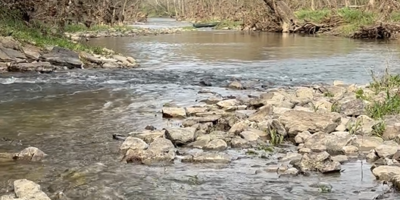By Joan Braune
Mountaintop removal has led to poisoned drinking water, deadly avalanches, and unemployment in Appalachian communities. The recurring blasts shake homes, destroy graveyards and other important sites, and irreparably flatten the beautiful mountains and forests, some of the oldest in the world. Residents of the region are often left feeling as though they are living in a war zone. In a constant drive for profit, coal companies treat coalfield residents as collateral damage, “externalities” that do not need to be taken into account.
Yet, as the destructive and dehumanizing practice of mountaintop removal continues, it has spawned a rising movement. Last September, two thousand people rallied in Washington, D.C. at an event titled “Appalachia Rising,” and this spring, thousands rallied in Frankfort at the state capitol for “Kentucky Rising.” This summer, a march on Blair Mountain (historic site of the bloodiest battle in U.S. labor history, and currently being mountaintop removal-mined) is being advertised with the slogan, “Appalachia is Rising.”
The message of recent events is clear: long exploited, stereotyped, and marginalized, Appalachians are redoubling their long struggle for their rights and are rising up against mountaintop removal, working in solidarity with social justice and environmental groups to achieve their aims.
UK Rising
An enthusiastic crowd of students and community activists gathered in an open area framed by a cluster of University of Kentucky dorms on Friday, April 8, to learn more about mountaintop removal and to share their stories about experiences with coal.
The event, titled “UK Rising,” was sponsored by UK Kentuckians for the Commonwealth. Music and a vegan potluck supper were followed by speakers on the issue. Even as it began to rain, people stayed for the speeches, keeping dry along a covered walkway.
Speakers at UK Rising included Appalshop intern Ada Smith, retired miner Stanley Sturgill, and UK Physics graduate student Martin Mudd.
Ada Smith grew up in Appalachia, left the region to attend college, and has returned to fight mountaintop removal. Deeply impassioned about the impact of mountaintop removal on her region, she pulled no punches, urging the audience to do their part to speak out against mountaintop removal and stressing that the lives of Appalachians are at stake. If you do nothing, she stated, “you are killing us.” The event as a whole emphasized the responsibility of those who do not live in Appalachia to speak out against mountaintop removal, since those living in the region often cannot speak out without putting themselves and their families into danger.
The following speaker, Stanley Sturgill, spent 41 years as a coal miner and now has black lung disease. A third generation coal miner, he said that his grandparents would have been appalled at mountaintop removal and its devastating impact on Appalachian culture.
In passing, Sturgill offered an analogy I found especially striking, comparing his opposition to the Afghanistan and Iraq wars with his opposition to mountaintop removal, and comparing his concern for the U.S. troops with his concern for coal miners. Although some claimed that those who opposed the wars did not “support the troops,” Sturgill knew young people in the military, and he opposed the wars precisely because he did not want them dying needlessly.
Similarly, contrary to the lie propagated by the coal companies that anti-mountaintop removal activists care only about the mountains and do not care about miners, Sturgill emphasized that it is logical to oppose mountaintop removal and to support miners. Since mountaintop removal has put many miners out of work and is wreaking havoc on Appalachian communities, opposition to mountaintop removal is the truly pro-miner position.
Discussing the meaning of “direct action,” graduate student Martin Mudd urged hope, concerted resistance, and respectful engagement with the opposition. Warning of the need to avoid despair, he pointed out that activists should be wary of becoming overly attached to the expectation of any particular outcome for their efforts. Continuing to struggle for justice, one must remain committed (and have some fun, too), even if the struggle is a long one.
Appalachia is rising, and it is in it for the long haul. These are exciting times to be on the front lines of the struggle for justice.




Leave a Reply